Commonwealth leaders have told Eastern Eye that the UK government is “hell bent on destroying the Commonwealth in pursuit of a colonial agenda”.
But now her supporters have warned that the UK’s “very personal vendetta is splitting the Commonwealth family apart”.
It is just a week (20-26 June) before a crucial summit of the so-called Commonwealth Heads of Government Meeting [CHOGM] in Rwanda decides her future.
In an unprecedented move in the 73-year history of the Commonwealth of Nations, Britain wants to remove the current secretary general, a Labour peer.
Her backers warned it could cause irreparable damage.
Never in its history has a secretary general been challenged for a second term in office.
“Since her first day in office, the Brits saw the SG [secretary general] as their puppet,” said one non-UK Commonwealth insider.
“They expected her to bend her knee to them, to do their bidding, because they saw her as a Briton.
“When she refused, they put their entire government machine against her.
“First, they gave the false impression Patricia was in charge when they gave the organisation a grade-C on the running of the secretariat when she’d been in the job a matter of weeks.
“Then they gave her no credit when she turned the organisation into an A-plus administration in less than 12-months.
“Instead, they got people to brief against her to member states the press.
“It’s been quite a campaign by the UK government to drip poison into the ears of anyone foolish and gullible enough to listen and accept their lies.”
Pioneering secretary general
Scotland is the first woman to run the secretariat after she was voted in as the candidate for Dominica, the place of her birth, during a Commonwealth Heads of Government Meeting [CHOGM] in Malta in 2015.
She assumed office at the headquarters in Pall Mall, London, on 1 April 2016.
Last month (19), the prime minister tweeted, “With a month to go until the Commonwealth comes together in Rwanda, delighted to confirm the UK will support @kaminajsmith’s campaign to be the next secretary general.
“She has the vast experience & support to unite our unique family of nations and seize the opportunities ahead.”
His foreign secretary, Liz Truss, followed up her leader’s tweet, “The UK will be supporting @kaminajsmith’s campaign to be the next Commonwealth secretary general.
“She is ideal to lead this great organisation committed to democracy, prosperity and peace.”
Labour’s shadow foreign secretary, David Lammy responded, “The chair of the Commonwealth is supposed to maintain neutrality and confidentiality.
“No chair has ever done this in the Commonwealth history. It’s unseemly and divisive.”
But this is not the first time the UK has backed a candidate other than Scotland.
In September 2021, Kenya announced its intention to put up former defence minister, Monica Juma, against Scotland.
“Egg on faces”
Just two months earlier [July 2021] UK announced “£132m of new investments in Kenya”.
The government quoted its then foreign secretary, Dominic Raab, “This £132 million package of new UK-Kenya deals from the UK government and British firms will support investment in the region, including building new green affordable homes, connecting households to clean energy, and boosting manufacturing.
“This package of investments will create new jobs and unlock new opportunities for UK and Kenyan businesses by strengthening the relationship between Nairobi and the City of London.”
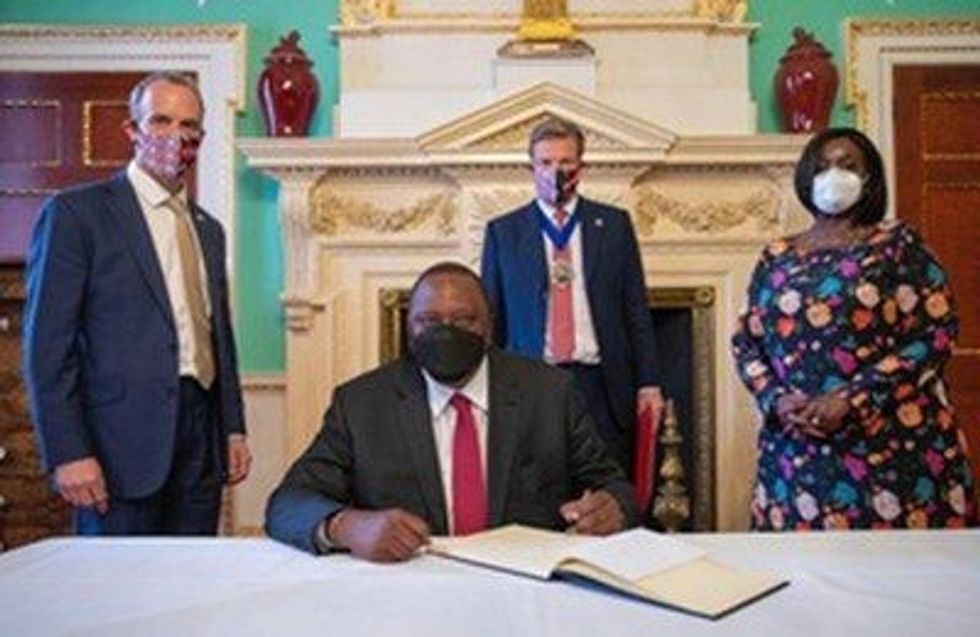
As late as 23 September 2021, Truss, now the prime minister’s new foreign secretary, tweeted, “Great meeting Kenya’s cabinet secretary for foreign affairs Raychelle Omamo.
“We discussed Monica Juma’s candidacy for the Commonwealth secretary general role”
But in February 2022, Juma mysteriously quit the race.
At the time, Kenyan newspapers described their high commissioners as having “to scramble to clean the egg on their faces”.
Worse, they reported, Juma was forced to pull out of a planned trip to the Caribbean, because of the region’s overwhelming support for Scotland.
According to one Australian newspaper, Kenya’s foreign ministry said it had “become apparent that some member states of the Commonwealth are uncomfortable and/or unwilling to provide their support for our candidate.”
Australia has been steadfastly against the incumbent, and it has made no secret of its opposition.
On April 21, Kamina Johnson Smith, formally launched her bid to unseat the incumbent at the Jamaican High Commission in London.
Last month (5 May), Downing Street put out a press release detailing a call with the prime minister and his Jamaican counterpart, Andrew Holness.
“The prime minister highlighted that British international investment is expanding in Caribbean, and the leaders agreed to explore greater cooperation on green and sustainable infrastructure projects,” it said.
“They looked forward to meeting in person at the Commonwealth Heads of Government meeting in June to drive forward collective action…”
Failed move
Exactly a fortnight after this phone call, Johnson tweeted his support for Johnson Smith.
“The failed move to put in an African, and now the Jamaican candidate proves beyond a shadow of doubt that Britain is hell bent on getting rid of this wonderful secretary general,” said one African diplomat.
“They are desperate, and they think people are stupid.
“They are going around cajoling and bribing member states to put up candidates to challenge Baroness Scotland.
“They’re going around flashing cash and promises, but like the devil their favour has strings attached.
“Toe our line and we will help you. The UK have bribed and bullied their way to this situation, just as they did during Empire.
“This is their agenda. Colonialism by any other name.
“They are hell bent on destroying the Commonwealth in pursuit of a colonial agenda.”
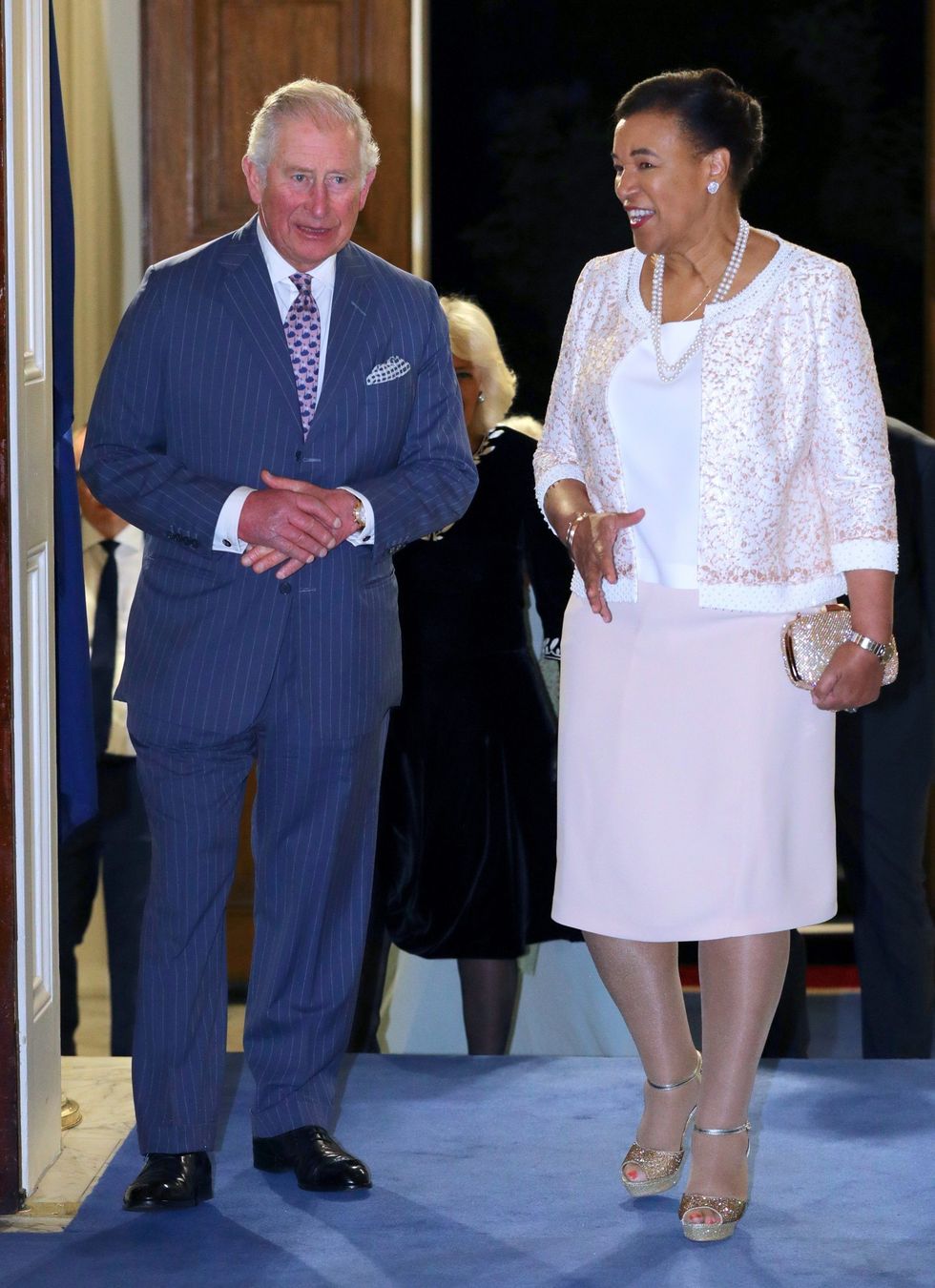
Sources have told us that Kenya has “never really explained why Jumo stood down, and it is extremely suspicious why her support evaporated.”
One UK parliamentarian said, “The FCO [Foreign and Commonwealth Office] are calling high commissioners asking them to issue statements of support for the Jamaican candidate.
“However, they see Johnson [the British prime minister] as a busted flush and untrustworthy.
“He lies, lies, lies, and says whatever he thinks governments want to hear.
“They are fed up with his administration being hell bent on destroying the Commonwealth in pursuit of a colonial agenda.”
Since Brexit, said another source, Britain has been scrambling around to try to find new markets.
The House of Commons library’s latest figures show that exports from the UK to the European Union fell from 54 per cent in 2006 to 42 per cent in 2020.
Yet the EU remains the UK’s largest trade partner with £254 billion exports compared to £301 billion imported goods.
A source from the Caribbean said, “What Britain is doing has never happened in the history of the Commonwealth, and every incumbent has been allowed to serve a second term unopposed.
“The UK, Britain, have not been shy in making it known that Empire 2.0 is their aim.
“They’ve not been shy in making it known that they have their eyes on the markets and resources of Africa, on the resources of the Pacific.
“They are not being shy about the fact that where is trade and investment, there are opportunities.”
Chinese influence
What has surprised Indian supporters of Scotland is their country’s support for the Jamaican candidate.
Johnson Smith’s department trumpeted India’s backing on its website last month.
According to the country’s foreign ministry, India’s external affairs minister Dr Subrahmanyam Jaishankar wrote to his Jamaican counterpart.
It said that she had “excellent credentials and impeccable track record can offer the right leadership to the Commonwealth at this important juncture.”
“I don’t understand what my country’s playing at,” one Indian diplomatic source told Eastern Eye.
“China is backing Jamaica to the tune of almost a billion American dollars. Don’t our politicians get that?”
China’s economic contribution to Jamaica is confirmed by the country foreign ministry.
In his farewell message in March, the Chinese ambassador to Jamaica, Tian Qi wrote, “I still remember that the MOU between China and Jamaica on cooperation within the framework of the Belt and Road Initiative and the cooperation plan between the two governments on jointly promoting Belt and Road cooperation were signed in April and November 2019 respectively.”
China’s Belt and Road initiative is about ploughing billions of pounds into the infrastructure of foreign countries, creating physical and metaphorical trade links.
Critics of the idea say this is about exerting political power and influence through the back door.
Tian played up his country investment, and influence, in Jamaica in his valedictory message.
“The bilateral trade volume between China and Jamaica has increased from US$660 million in 2018 to US$816 million in 2021.
“China’s new direct investment in Jamaica has increased US$320 million since 2018.
“In the past four years, I have witnessed the lobster, rum and Blue Mountain coffee from Jamaica getting more popular in China.
“I have witnessed the completion of the new headquarters of the Ministry of Foreign Affairs and Foreign Trade of Jamaica, which officially came into service in January 2022.
“I have witnessed the new building of the Confucius Institute at the UWI Mona, accommodating a large number of Jamaican students attracted by the Chinese culture.”
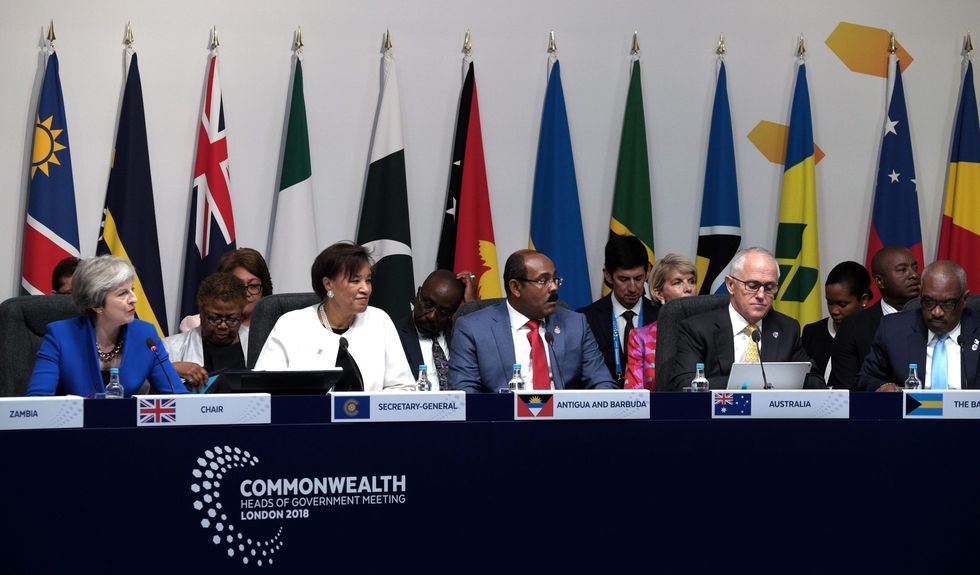
China’s growing global influence, and its ties with Russia, should concern Delhi, said our source in India.
“This is creeping Sino influence, and very soon China will interfere with the Commonwealth.
“In fact, I predict in the next decade, it’ll be the Commonwealth plus China, with China having a proxy vote, vetoing things which will make India stronger.”
No understanding
What has annoyed many member states is Britain’s lack of basic understanding of what the Commonwealth works, several sources told Eastern Eye.
Although many countries were once part of the British empire, today many are republics who despise the UK, they said.
Further, when they discuss issues affecting the Commonwealth, each country’s voice carries equal weight, and consensus is the key difference between this organisation and something like the United Nations.
That means Nauru, a Pacific nation with 10,000 citizens and the smallest member state, is just as powerful as India with its 1.4 billion people.
Several member states have told the UK that Scotland should be allowed to finish her second term, which is scheduled to end in 2024.
“I will tell you, the majority of us are very disturbed by the recent developments we've seen to the contrary,” said another Caribbean diplomat.
“It has not happened to anyone before, everyone else has been given a fair opportunity.
“This will set a precedent and damage the Commonwealth family, and there is no reason why she should be dispossessed of what is her right.
“We pride ourselves on being a unified body, a unified family, and we are concerned whenever we find that there is anyone who would cause or allow pinch points to develop in the family.
“We're hoping that better heads will prevail, and that good decisions will be made, and that Patricia will indeed be allowed to complete her second term.”
Diplomats and Commonwealth observers have told Eastern Eye that three fundamental informal “rules” are enshrined in practice.
First, the informal understanding among member states is that secretaries general be allowed to finish a second term without being opposed.
Second, they take it in turns to nominate candidates from a particular region.
Scotland was the Caribbean’s choice, and in 2024 where her term is supposed to end, Africa will have one of its candidates in office.
“So, here's the scenario,” said a source in the Caribbean, “if the SG gets her two years at CHOGM, Africa will fully expect it to be their turn in 2024.
“But if the SG loses, then Kamina Johnson Smith will end have the right to serve another eight years, even if she says she will only serve the remaining two.
“That means Africa will have to wait till 2030.”
The third unwritten rule is that the British monarch is the head of the Commonwealth.
Monarch support
Sources have told Eastern Eye that during the London CHOGM in 2018, the queen specifically asked the chair in office, Malta, to persuade member states to continue that tradition.
Prince Charles will be in Rwanda representing his mother, and he will become head of the Commonwealth when she passes.
According to a UK parliamentarian, the secretary general’s relationship with the Palace has never been stronger.
“Throughout her tenure both the queen and Prince Charles have privately supported her behind the scenes,” they said.
“They don’t believe what they’ve heard about the SG, and they have told her so privately.”
An African Commonwealth source said that, once again, they expect Britain will be on the worng side of history.
“Do the maths. Two to three Caribbean states have never liked Baroness Scotland.
“In Africa, Britain may get a couple, perhaps Kenya. The Maldives will vote with Britain because the government’s flashed lots of cash.
“You have Australia, New Zealand and Canada which have never liked her. That’s still not enough.
“Also, think about this. Why would you back a candidate with just one month to go? They’ll now be scrabbling to pick up votes.”
We asked the foreign office to answer three questions, and we made clear that we would not carry spin or anything on background.
It refused to answer our questions.
Separating truth from fiction in claims made about Scotland by the British media
Some in the UK media have printed allegations which continue to be circulated despite being rejected by the secretariat. Over the past two years, Eastern Eye has spoken to many sources who have told us a different version of events to those being claimed.
1. ALLEGATION: The media accused the secretary general of profligacy and "signing off" on an expensive renovation of her London residence.
FACT: It is always the previous secretary general who decides what refurbishments are needed. Similarly, Scotland will decide what needs to be done to the comparatively rundown property in Mayfair at the end of her second term.
Eastern Eye has learnt that after the renovations took place, it was valued by a reputable estate agent as part of the lease agreement on the building. Its value was drastically reduced compared to other houses in the area which had been renovated, said sources, and it “did not reflect a building which had been “lavishly” renovated.”
Leaked documents to the media at the start of Scotland’s tenure, suggested she was planning to spend money on expensive items. The secretary general put a stop to any proposals to spend “lavishly” the moment she heard about them.
2. ALLEGATION: The media accused Scotland of "cronyism" when she selected Lord Patel of Bradford to carry out a review of the governance and operations of the administrative arm of the Commonwealth.
FACT: The secretary general never hid that she knew Lord Patel. But as Eastern Eye reported in February 2020, a senior official in the secretariat advised Scotland about the rules, and that it was their team which was “hiring the peer at arm’s length”. Further, we revealed that Lord Patel was paid a fraction of the going rate and his employment was always within procurement rules.
Eastern Eye also revealed that the media accused Scotland of paying her friend £252,000. That figure was in fact £150,000 excluding VAT for a three-person team carrying out hundreds of hours work. Top consultancies would have charged over £1 million, said our sources.
3. ALLEGATION: The media in the Caribbean said that Australia, Britain and New Zealand “withdrew” their concessionary funding because of Lord Patel’s contract.
FACT: High ranking Commonwealth sources told this newspaper, “Nothing could be further from the truth.
“Existing concessionary funds weren’t withdrawn because of this contract.
“On the contrary, one of the named countries not only maintained their funding but increased funding to specific areas of the secretariat’s work in an ‘extra-budgetary’ fashion.”
We understand that auditors returned a clean bill of health report on this spending and all deals in the secretariat under her watch.
4. ALLEGATION: The media has repeatedly reported that “50 waivers of procurement were undertaken over three years”.
FACT: What these reports do not say is WHEN these waivers took place. Eastern Eye was told that the secretariat issued the majority BEFORE Scotland became secretary general. Not only that, no procurement rules were broken because “waivers are allowed under certain circumstances”.
More than this, all 54 nations know what is being acquired because they are published regularly so they can audit and hold the secretary general and the secretariat to account.
“The transformation of the governance of the secretariat is on the record and cannot be denied,” a senior source told Eastern Eye.
‘Smear campaign against her was relentless’
I came across Baroness Patricia Scotland in 2006. She was a home office minister in Tony Blair’s government, and I was a BBC correspondent naive enough to believe that I could help bring in new laws.
Along with south Asian women’s groups, I wanted forced marriage to be a criminal act. The Baroness was having none of it.
I like to think I remained professional, but I remember saying, rather arrogantly, “It will happen. The people want it, and the girls and women deserve it.”
The following year, the government supported a private member’s bill, and the Forced Marriage Act (2007) became law.
Roll forward almost a decade to August 2016, and I end up working with Scotland, the new Commonwealth secretary general of four months, as my boss.
The first conversation was to make clear my role, and I learnt that during her tenure she would be plain Patricia Scotland or SG, short for secretary general. No titles.
My role was to advise on public relations and media enquiries.
To say it was a turbulent two years would be an understatement. I sum it up, when anyone asks, as the “vitriol and leaks” chapter in my professional life.
Internal leaks from malicious colleagues within the secretariat, and vitriol from the press who printed inaccurate allegations, painting them as fact.
Accuracy is at the heart of journalism.
But here is the standard many journalists practise today.
Q: When was the last time you cheated on your partner, Mr Choudhury?
A: I’ve never cheated on my partner.
Headline: Choudhury denies cheating on wife
It’s accurate, but it is damaging and raises the question, can there really be smoke without fire?
We were constantly firefighting. Because of the press, we could never get on the front foot, no matter the secretary general’s innovative and inspirational leadership. Here is what I remember – from day one being taken to one side by UK foreign office mandarins and being told how awful Patricia Scotland was, how she never listened to anyone and how arrogant she was. Here is what I remember – having to cope with four hours sleep because if the SG is awake, then so are you. Here is what I remember – Patricia Scotland’s two favourite words “pro bono” or “for free”. She persuaded so many people to give of their expensive and precious time at no cost to the governments who funded her.
Here is what I remember – the SG galvanising aid to member states hit by weather disasters, and she championed the small states. I remember her being ahead of the curve when it came to climate change. After my time, she would later do the same during Covid.
Here is what I remember – during a ministerial meeting in 2017, a British delegate said, “Britain pays the most and the piper calls the tune. You do as we say.” Their comments met with uproar, according to my colleagues who attended. I dismissed it because I thought no-one could be so stupid. But in 2018, in the run up to CHOGM, I witnessed the arrogance and colonialism for myself. In another ministerial meeting, the moment the Brits landed they demanded resources and tried to dictate events. I witnessed the way they spoke without respect for either the hosts or my boss. I was responsible for the media coverage of the ministerial meeting, working closely with the excellent international team. One the second day, the British team commanded the hosts to give them a camera crew so they could capture material for a British foreign office minister. The protocol was that they should ask me, and I would try to help. The UK team were told this politely several times, yet their members decided that, by stamping their feet and speaking loudly, they would get what they wanted. The host team came to me upset about the way they were being treated and asked for my advice. Never one to reward bad behaviour, unfortunately, the UK found that all the camera crews were otherwise indisposed. I never did know what happened to the ministerial visit. My diary notes use rather colourful language to describe the attitude of my fellow British citizens.
Here is what I remember – a two-day event when the Foreign and Commonwealth Office organised a joint pre-CHOGM meeting in 2018. It was an important moment. Britain was about to take over as “the chair” of the Commonwealth from Malta. The Brits wanted to make sure everything went right. Our role was to ensure equality among all member states. Officially the family were 52 at that time because The Gambia and Maldives were not part of the Commonwealth of Nations. In the room were diplomats and senior officials from the secretariat and the FCO. The first exercise was for each team to decide what success looked like. It was telling that the UK chose as their number one priority “creating trade for the UK”. Honest perhaps, but completely wrong, which was made in forceful terms by a senior secretariat colleague in the room.
Look, it does not mean the current secretary general did not make errors. She did. Her biggest weakness was trusting people, giving them the benefit of the doubt and expecting them to act professionally, honestly and decently for the good of the 2.4 billion people she serves. If I were Scotland, I would have been more forceful in fighting the British for the sake of my reputation. But she believes unashamedly and passionately in the rule of law, the word of the Commonwealth family and the service to her queen, the head.
But I am reminded by comments from several sources. If Boris Johnson made the right big calls and asks for forgiveness despite misleading parliament and the British people, then for someone who always observed the rules, she deserves gratitude and support from member stated, not a kick-in.
For those who say that Patricia Scotland lacks humility, is arrogant and has a “tin ear”, my final memory is of accompanying her on a trip to the Commonwealth Games on Australia’s Gold Coast. We are at a conference highlighting the achievement of women. One of the delegates from the UK comes over and thanks the SG for helping to pass the forced marriage act. The SG points to me and says, “Thank him. He gave me a hard time when I was a minister, and he made his opinions quite forcefully several times.”
Barnie Choudhury was director of media and PR for the Commonwealth between August 2016 and August 2018.

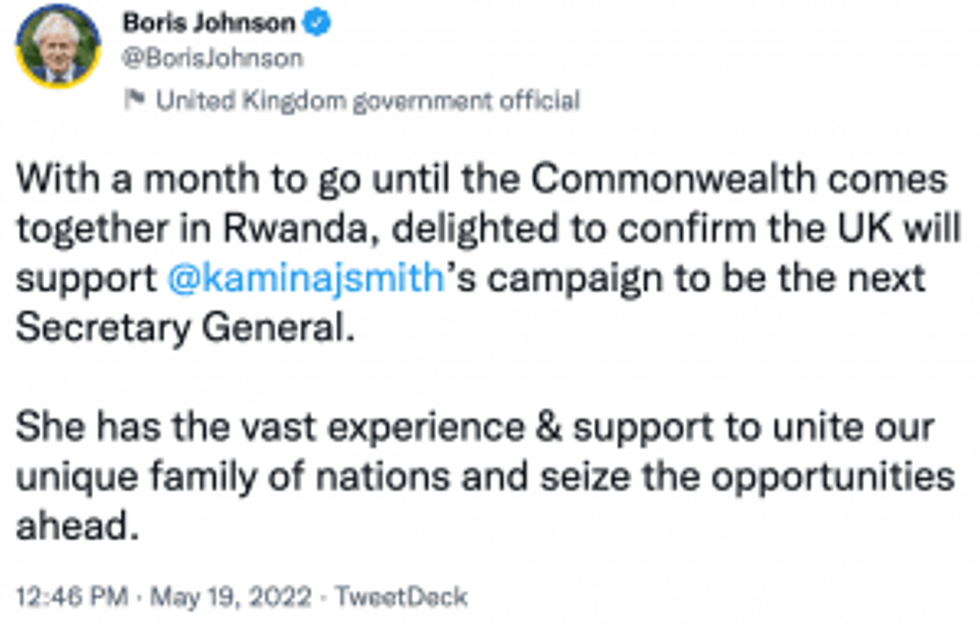
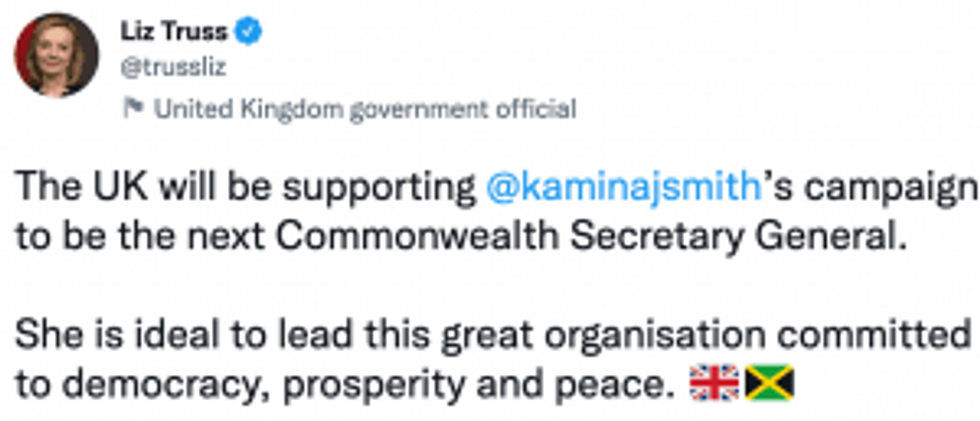
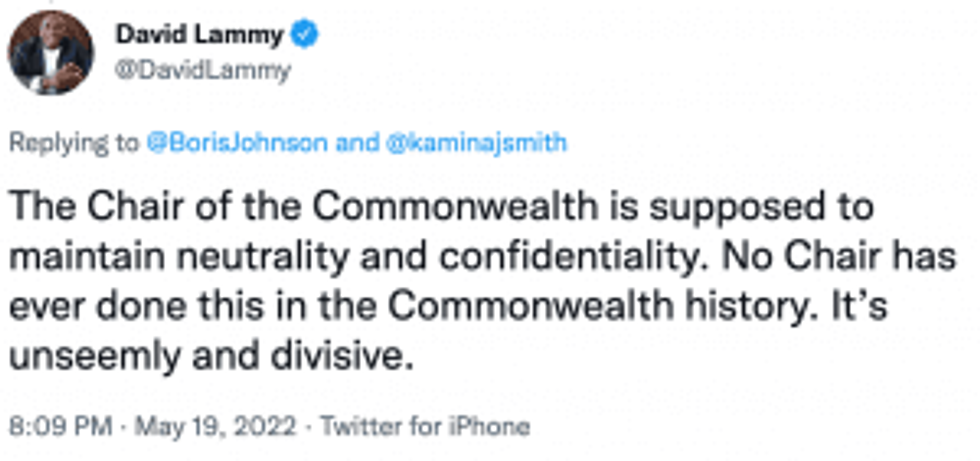






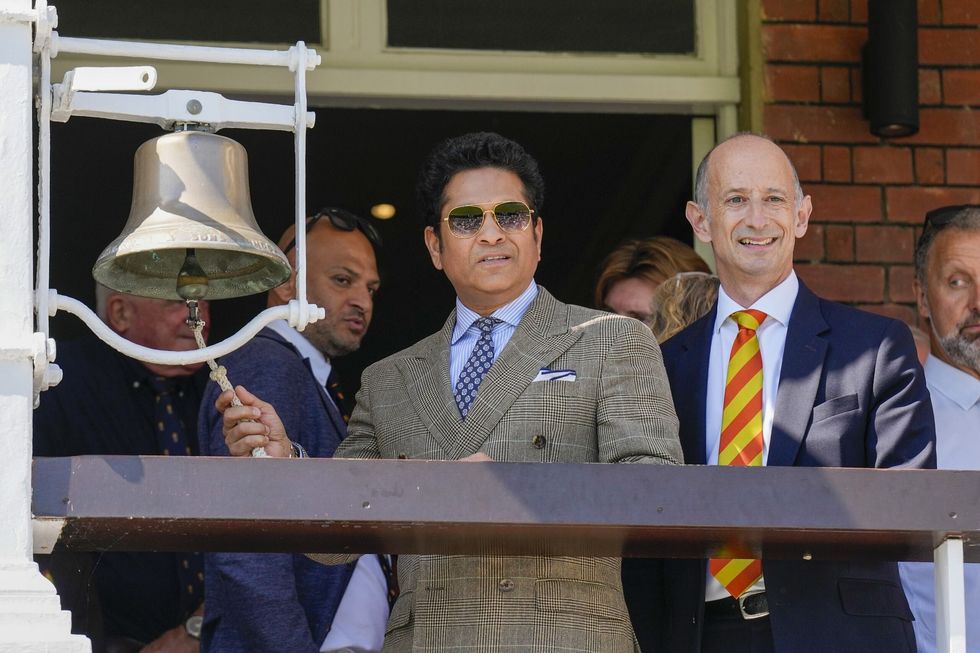 (Photo credit: PTI)
(Photo credit: PTI)










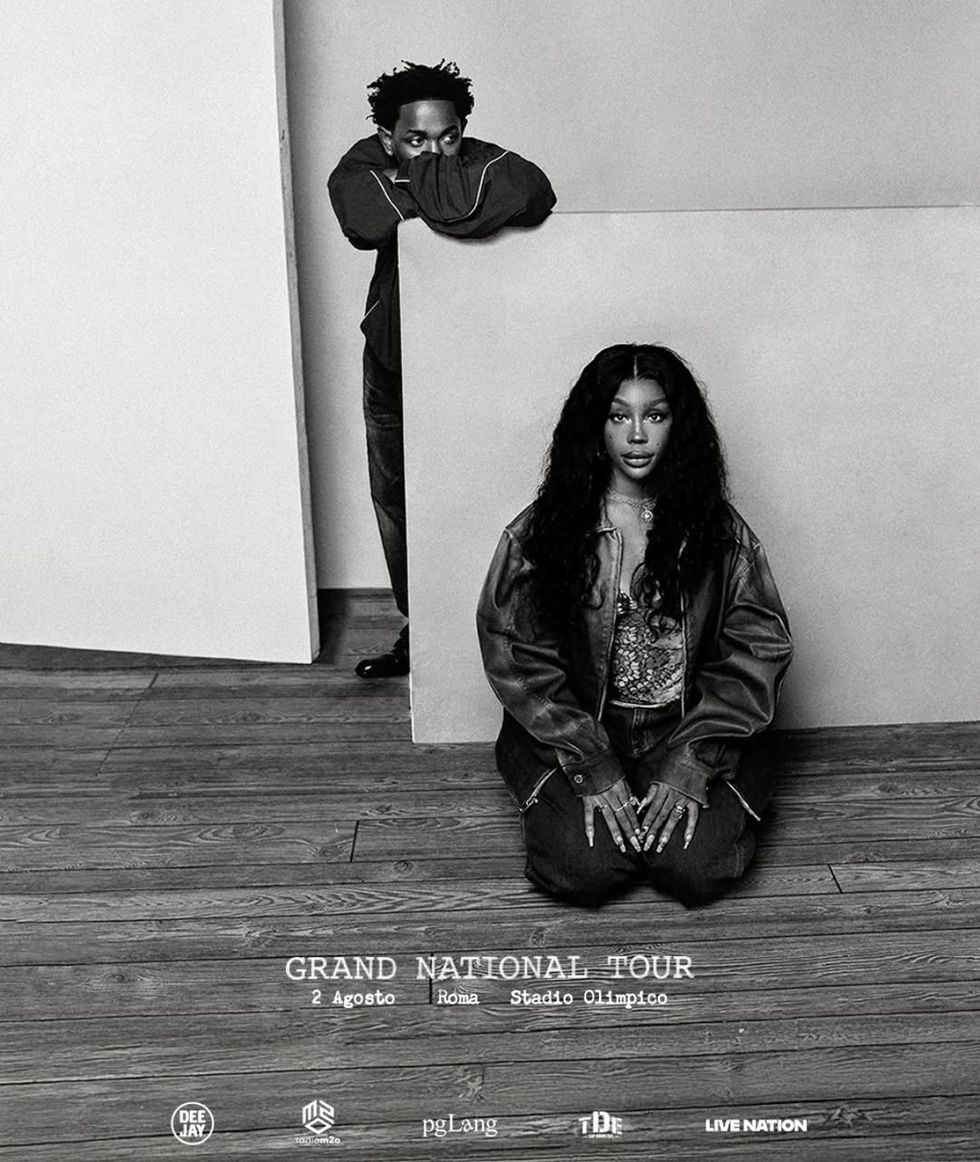 Kendrick Lamar and SZA commands the stage at Villa Park during his explosive opening setInstagram/
Kendrick Lamar and SZA commands the stage at Villa Park during his explosive opening setInstagram/
